- Home
- Jonathan Stroud
The Ring of Solomon: A Bartimaeus Novel Page 7
The Ring of Solomon: A Bartimaeus Novel Read online
Page 7
Guard Captain Asmira made the journey in a single night, carried by a cone of whirling sand.
Outside the protective Mantle, in the howling darkness, the storm of sand grains scoured the air. Asmira saw nothing; she sat crouched with her arms clasping her knees, eyes tight shut, trying to ignore the voices that, from amid the whirlwind, continually screamed her name. This was a provocation on the part of the spirit that carried her, but otherwise the priestesses’ strictures held firm. Asmira was neither dropped, nor crushed, nor torn asunder, but carried without harm; and set down gently just as dawn was breaking.
Painfully, by slow degrees, she uncurled herself and allowed her eyes to open. She sat on a hilltop, in the centre of three perfect rings of sand. Small thickets of brush were dotted here and there, and razor-grass, and rocks that glinted in the rising sun. A little naked child was standing on the hillcrest, watching her with bright, dark eyes.
‘There is Eilat,’ the djinni said. ‘You will reach it late morning.’
Asmira looked, and far away saw a yellow cluster of lights hanging smudged and distant in the lifting darkness, and close beside it a flat white line, thin as a knife-blade, separating sky and land.
‘And that,’ the child added, pointing, ‘is the sea. The Gulf of Aqaba. You are at the southernmost point of Solomon’s kingdom. From Eilat you can hire camels to take you to Jerusalem, a journey still of several hundred miles. I myself can bear you no further safely. Solomon has established shipyards in Eilat, that he may control the trading routes along the coast. Some of his magicians are here, and many spirits, who will be vigilant against intruders such as me. I cannot enter the town.’
Asmira was getting to her feet, gasping at the stiffness of her limbs. ‘Then I thank you for your help,’ she said. ‘When you return to Marib, please express my thanks also to the priestesses and my beloved queen. Say that I am grateful for their assistance, and that I shall carry out my task with the full vigour of my being, and—’
‘Don’t thank me,’ the child said. ‘I only do what I am forced to do. Indeed, were it not for the threat of the Dismal Flame I would devour you in a twinkling, for you are a succulent-looking morsel. As for the queen and her minions, in my opinion your gratitude to them is equally misplaced, since they send you to a miserable death, while their backsides continue to expand at leisure in the soft luxuries of the palace courts. Still, I’ll pass your regards on.’
‘Foul demon!’ Asmira snarled. ‘If I die, it shall be for my queen! My nation has been attacked and the Sun God himself has blessed my venture. You know nothing of loyalty or love of homeland! Be gone from here!’
She clasped something that hung about her neck and spoke an angry syllable; a flashing disc of yellow light struck the djinni and sent it somersaulting backwards with a cry.
‘That was a pretty trick,’ the little child said, picking itself up. ‘But your power is thin, and your motives even thinner. Gods and nations – what are they but words?’
It closed its eyes; was gone. A gentle breeze blew away into the south, scattering the perfect rings of sand and making Asmira shiver.
She knelt beside her leather bag, and removed from it her water-skin, a pastry wrapped in vine leaves, a silver dagger, and her travelling cloak, which she placed about her shoulders to keep warm. Her first action was to drink deeply from the skin, for she was very thirsty. Next she ate the pastry with brisk, efficient little bites, staring down the hill, planning her route towards the town. Then she turned to face the east, where the Sun God’s disc was just pulling free of the Earth. Somewhere far away it settled on fair Sheba too. His glory blinded Asmira, his warmth fell on her face. Her movements slowed, her mind emptied; the urgencies of her mission loosened their hold upon her. She stood upon the hilltop, a slight, slim young woman, with gold light shining on her long dark hair.
When she was still very young, Asmira’s mother had taken her to the palace roof and walked her in a circle, so she could look out all around.
‘The city of Marib is built on a hill,’ her mother said, ‘and this hill is Sheba’s centre as the heart is the centre of the body. Long ago, the Sun God ordained our city’s size and shape, and we cannot build beyond its limits. So we build upwards! See the towers rising on every side? Our people live within them, a family to a floor, and when the need arises we build another level in fresh mud brick. Now, child, look beyond the hill. You see that all about us is green, while beyond lies yellow desert? These are our gardens, which keep us all alive. Each year snows melt in the mountains and run in torrents along the dust-dry wadis to irrigate our lands. Queens of the past cut the channels to irrigate the fields with water. Maintenance of these channels is their most important duty, for without them we die. Now look to the east – see that range of blue-white mountains? That is the Hadhramaut, where grow our forests. These trees are our other most precious resource. We harvest their resin and dry it … and what does it become then?’
Asmira had hopped and capered with excitement, for she knew the answer. ‘Frankincense, Mother! The stuff the hill-men stink of!’
Her mother had placed a steely hand upon her daughter’s head. ‘Not so much jigging about, girl. A palace guard does not cavort like a dervish, even at the age of five. But you are right. This incense is our gold, and makes our people rich. We trade with distant empires far away beyond the deserts and the seas. They pay well for it, but they would steal it if they could. Only the great sands of Arabia, which an army cannot cross, have shielded us from their greed.’
Asmira had stopped her spinning. She frowned. ‘If enemies came here,’ she said, ‘the queen would kill them. Wouldn’t she, Mother? She keeps us safe.’
‘Yes, child. Our queen keeps Sheba safe. And we in turn keep her safe – the guards and I. That is what we are born to do. When you grow up, dear Asmira, you too must protect our blessed lady with your life – just as I have, and our grandmothers did before us. Do you so swear?’
Asmira was as still and serious as could be. ‘Mother, I do.’
‘Good girl. Then let us go down and join our sisters.’
At that time the old Queen of Sheba had not yet grown too heavy to leave the palace, and was accompanied wherever she went by an escort of her guard. As its leader, Asmira’s mother always walked right behind the queen, close as a shadow, curved sword hanging easily at her waist. Asmira (who particularly admired her mother’s long and shining hair) thought her far more beautiful and regal than the queen herself, though she took care not to mention this to anyone. Such a thought was possibly treasonous, and there was a place for traitors on the bare hill beyond the water meadows, where their remains were picked over by little birds. Instead she contented herself imagining the day when she would be First Guard and walk behind the queen. She went out to the gardens behind the palace and, with a severed reed stem, practised savage swordplay, putting ranks of imagined demons to full and awful flight.
From the earliest age she joined her mother in the training hall, where, under the watchful eye of the wrinkled guard-mothers, who were now too old for active service, the women of the guard daily learned their craft. Before breakfast they scaled ropes, ran around the meadows, swam in the canals below the walls. Now, their muscles readied, they worked six hours a day in the echoing, sunlit rooms, sparring with swords and twirl-staffs, duelling with knives and whirling fists, throwing discs and daggers into straw-stuffed targets across the floor. Asmira would watch it all from the benches, where the guard-mothers bound wounds and bruises in cloths lined with soothing herbs. Often she and other girls would pick up the little wooden weapons laid out for them, join their mothers in gentle play-fights, and so begin their training.
Asmira’s mother was the most accomplished of the women, which is why she was First Guard. She ran fastest, fought most fiercely, and above all threw the little shining daggers more accurately than anyone else. She could do this standing, moving, and even on the half-turn, sending the blade hilt-deep into any chosen target far off al
ong the hall.
Asmira was mesmerized by this. Often she scampered up, holding out her hand. ‘I want a go.’
‘You’re not old enough,’ her mother said, smiling. ‘There are wooden ones that are better weighted, so you don’t do yourself a mischief. No, not like that’ – for Asmira had prised the dagger from her grasp – ‘you need to hold the point lightly between the thumb and forefinger … like so. Now, you must be calm. Close your eyes, take a deep, slow breath—’
‘Don’t need to! Watch this for a shot! Oh.’
Her mother laughed. ‘Not a bad attempt, Asmira. If the target was six paces to its right and twenty paces nearer, you would have hit it square on. As it is, I’m glad I don’t have slightly larger feet.’ She stooped, picked up the knife. ‘Have another try.’
The years passed, the Sun God worked his daily passage through the heavens. Now Asmira was seventeen years old, light of foot and serious of eye, and one of four newly promoted captains of the palace guard. She had excelled during the latest rebellion of the hill-tribes, and had personally captured the rebel chief and his magicians. She had several times deputized for the First Guard in standing behind the queen during ceremonies in the temples. But the Queen of Sheba herself had never once spoken to her, never once acknowledged her existence – until the night the tower burned.
Beyond the window, smoke still drifted on the air; from the Hall of the Dead came the sound of mourning drums. Asmira sat in the royal chamber, awkwardly holding a cup of wine and staring at the floor.
‘Asmira, my dear,’ the queen said. ‘Do you know who carried out this dreadful act?’
Asmira raised her eyes. The queen was sitting so close to her their knees almost touched. It was an unheard-of proximity. Her heart thudded in her chest. She lowered her gaze again. ‘They say, my lady,’ she stammered, ‘they say it was King Solomon.’
‘Do they say why?’
‘No, my lady.’
‘Asmira, you may look on me when you speak. I am your queen, yes, but we are both of us daughters of the Sun.’
When Asmira looked up once more, the queen was smiling. The sight made her a little light-headed; she took a sip of wine.
‘The First Guard has often spoken about your qualities,’ the queen went on. ‘Quick, strong and clever, she says. Unafraid of danger. Resourceful, almost reckless … And pretty too – I can see that for myself. Tell me, what do you know of Solomon, Asmira? What stories have you heard?’
Asmira’s face was burning and her throat felt tight. Perhaps it was the smoke. She had been marshalling the water-chains below the tower. ‘I have heard the usual tales, my lady. He has a palace of jade and gold, built in a single night with his magic Ring. He controls twenty thousand spirits, each more terrible than the last. He has seven hundred wives – and is therefore clearly a man of abominable wickedness. He—’
The queen raised her hand. ‘I have heard this too.’ Her smile faded. ‘Asmira, Solomon desires the wealth of Sheba. One of his demons carried out tonight’s attack, and when the moon is new – which will be in thirteen days – the full host of the Ring will come here to destroy us all.’
Asmira’s eyes opened wide in horror; she said nothing.
‘Unless, that is,’ the queen went on, ‘I pay a ransom. Needless to say, I do not wish to do so. That would be an affront to both Sheba’s honour and my own. But what is the alternative? The power of the Ring is too great to withstand. Only if Solomon himself is killed might the danger pass. But that is almost impossible, since he never leaves Jerusalem, a city that is too well-guarded for armies or magicians to hope to enter. And yet …’ The queen sighed heavily and stared out of the window. ‘And yet I wonder. I wonder whether someone travelling alone, someone with sufficient intelligence and skill, someone who seems harmless, and yet is not so – whether that person might find a way to get access to the king … And when she is alone with him, she might— Ah, but it would be a hard task indeed.’
‘My lady …’ Asmira’s voice quivered with eagerness, as well as fear at what she was about to say. ‘My lady, if there’s any way that I can help—’
The Queen of Sheba smiled benignly. ‘My dear, you need say no more. I already know your faith. I know your love for me. Yes, dear Asmira, thank you for suggesting it. I do believe you can.’
The rising sun hung low above the eastern desert. When Asmira stirred and turned to face the west again, she found the port of Eilat had become a clear white scattering of buildings, and the sea an azure strip, to which tiny white things clung.
Her eyes narrowed. Ships belonging to the wicked Solomon. From now on she must take care.
She picked up the silver dagger from where it lay beside her bag and tucked it in her belt, pushing it out of sight beneath her cloak. As she did so, her gaze strayed high above: she saw the outline of the waning moon, still hanging frail and ghost-like in the blue. The sight gave her fresh urgency. Twelve days remaining! And Solomon was far away. Picking up her bag, she jogged swiftly down the hill.
9
‘Watch where you drop those chippings,’ Faquarl snapped. ‘That last shower went down my neck.’
‘Sorry.’
‘And you might wear a longer skirt while you’re about it. I’m afraid to look up.’
I paused in my chiselling. ‘Can I help it if this is the current fashion?’
‘You’re eclipsing the sun. Move along a bit, at least.’
We scowled at each other. I moved a grudging inch to my left; Faquarl moved a resentful inch to his right. We went on carving.
‘I wouldn’t mind so much,’ Faquarl said sourly, ‘if we could do this properly. A quick Detonation or two would work wonders on this rock.’
‘Tell that to Solomon,’ I said. ‘It’s his fault we’re not allowed to— Ow!’ My hammer hit my thumb instead of the chisel. I hopped and pranced; my curses echoed off the rock-face and startled a nearby vulture.
All morning, since the dark-blue hour of dawn, the two of us had been toiling in the quarry below the building site, hacking out the first blocks for the temple. Faquarl’s ledge was somewhat below mine, so he got the worst of the view. Mine was fully exposed to the rigours of the risen sun, so I was hot and irritable. And now my thumb was sore.
I took a look around: rocks, heat haze, nothing moving on any plane. ‘I’ve had enough of this,’ I said. ‘Khaba’s not about, and nor is that nasty little foliot of his. I’m having a break.’ So saying, the handsome youth tossed his chisel aside and slid down the wooden ladder to the quarry floor.
Faquarl was the Nubian again, plump, pot-bellied, dusty and glowering. He hesitated, then threw his tools down as well. We squatted together in the shade beneath his half-squared block, in the manner of idling slaves the world over.
‘We’ve got the worst job again,’ I said. ‘Why couldn’t we be digging foundations with the rest of them?’
The Nubian scratched his stomach, selected a chipping from the rubble at our feet and picked his delicately pointed teeth. ‘Perhaps because our master dislikes us most particularly. Which in your case isn’t surprising, considering the lip you gave him yesterday.’
I smiled contentedly. ‘True.’
‘Speaking of the magician,’ Faquarl said. ‘This Khaba: what do you make of him?’
‘Bad. You?’
‘One of the very worst.’
‘I’d say top-ten bad, possibly even top-five.’
‘Not only is he vicious,’ Faquarl added, ‘but he’s arbitrary. Viciousness I can respect; in many ways I find it a positive quality. But he’s just a little too quick with the essence-flail. If you work too slow; if you work too fast; if you happen to be nearby when he feels like it – every opportunity, out it comes.’
I nodded. ‘Too right. He scoured me again last night simply because of a pure coincidence.’
‘Which was?’
‘I made a gratuitous comedy sound-effect just as he bent to retie his sandals.’ I gave a sigh and shook my head sadly. ‘Tru
e, it echoed off the valley walls like a thunderclap. True, several grandees of Solomon’s court were in attendance and hurriedly changed course to get upwind of him. But even so! The fellow lacks humour – that’s the root of the problem.’
‘Good to see you’re still as cultivated as ever, Bartimaeus,’ Faquarl said blandly.
‘I try. I try.’
‘But recreations aside, we need to be careful with Khaba. You remember what he showed us in the sphere? That could be either one of us.’
‘I know.’
The Nubian finished picking at his teeth and tossed the chip away. We stared out together at the pulsating whiteness of the quarry.
Now, to the casual onlooker the dialogue above may seem unremarkable, but in fact it scores highly for originality as it featured Faquarl and me having a chat without resorting to (a) petty abuse, (b) contrived innuendo, or (c) attempted murder. This, down the centuries, was a fairly unusual event. In fact there were entire civilizations that had hauled themselves from the mud, mastered the arts of writing and astronomy, and decayed slowly into decadence in the intervals between us having a civil conversation.
We’d first crossed paths in Mesopotamia, during the interminable wars between the city states. Sometimes we fought on the same side; sometimes we were ranged against each other in battle. This in itself wasn’t a big deal – it was par for the course for any spirit, and a situation quite outside our control, since it was our masters who forced us into action – but somehow Faquarl and I seemed to rub each other up the wrong way.

 The Leap
The Leap Buried Fire
Buried Fire Heroes of the Valley
Heroes of the Valley The Empty Grave
The Empty Grave The Hollow Boy
The Hollow Boy The Last Siege
The Last Siege The Dagger in the Desk
The Dagger in the Desk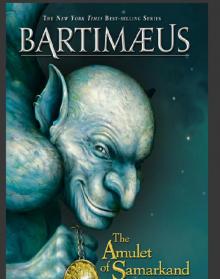 The Amulet of Samarkand
The Amulet of Samarkand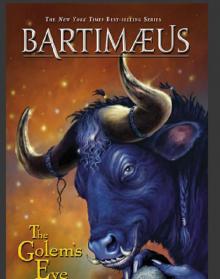 The Golem's Eye
The Golem's Eye The Screaming Staircase
The Screaming Staircase The Outlaws Scarlett and Browne
The Outlaws Scarlett and Browne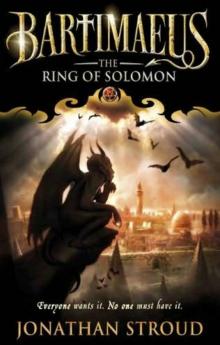 The Ring of Solomon: A Bartimaeus Novel
The Ring of Solomon: A Bartimaeus Novel Lockwood & Co
Lockwood & Co Lockwood & Co: The Screaming Staircase
Lockwood & Co: The Screaming Staircase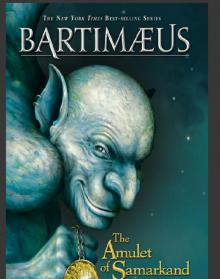 Bartimaeus: The Amulet of Samarkand
Bartimaeus: The Amulet of Samarkand The Amulet of Samarkand tbt-1
The Amulet of Samarkand tbt-1 Lockwood & Co.: The Creeping Shadow
Lockwood & Co.: The Creeping Shadow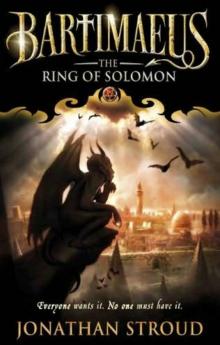 The Ring of Solomon
The Ring of Solomon Lockwood & Co. Book Three: The Hollow Boy
Lockwood & Co. Book Three: The Hollow Boy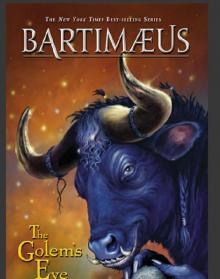 Bartimaeus: The Golem’s Eye
Bartimaeus: The Golem’s Eye